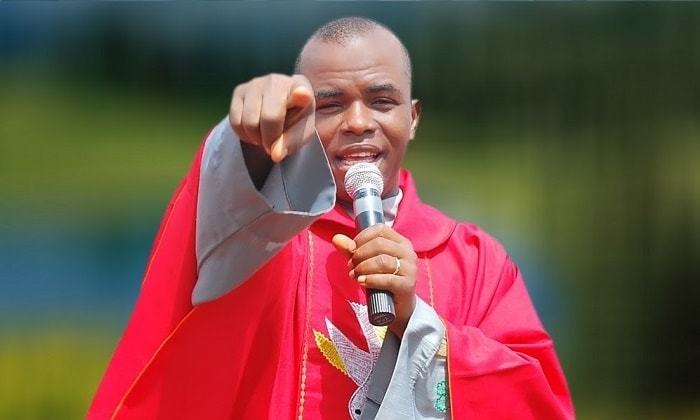The Catholic Archbishop of Lagos, Adewale Martins, says the Spiritual Director of the Adoration Ministry, Enugu, Rev. Fr. Ejike Mbaka, could be banned from preaching if he continues to deviate from the doctrines and tenets of the Catholic Church.
Martins, who was appointed Archbishop of Lagos by the Pope in 2012, said this during an interview with the BBC Igbo while reacting to Mbaka’s prophecy that Hope Uzodinma would emerge as governor of Imo State.
Mbaka had on New Year’s Eve prophesied that Uzodinma would emerge as governor in 2020, a prophecy which came to pass on Tuesday when the Supreme Court sacked Emeka Ihedioha and named Uzodinma as the duly elected governor.
Reacting to the prophecy, which has stirred heated debate, the archbishop said Mbaka was under the Diocese of Enugu and did not report to him.
He, however, said if Mbaka continued in the manner he was doing things, the Catholic Church may bar him from ministering.
Martins said, “Fr. Mbaka falls under the authority of the Bishop of Enugu Diocese and therefore he has the responsibility of cautioning him. I can imagine that this must be giving the bishop some challenges.
“It must be giving him a bit of a headache and I feel sorry for him and I hope he will find some way of dealing with this matter that has been recurring. Of course, what could be done in the end is either to say, ok you receive the sanction of being stopped from public ministry. That is a possibility. If it is not done, there must be a reason.”
Martins, who was ordained a priest in 1983, said the Catholic Church does not engage in partisan politics.
He said even if Mbaka received a prophecy from God, he ought to ensure that his conduct corresponds with the scriptures and the doctrine of the Catholic Church.
The archbishop added, “It is utterly surprising that Fr Mbaka would go as far as naming one person as governor against another. It is embarrassing when you hear of priests or people in position of authority making statements that are clearly partisan.
“The position of the Catholic Church on matters that have to do with politics is not to be partisan. Of course, we as a church cannot be oblivious to political events and happenings in the country or the world at large and therefore we must speak from the point of view of principles.
“The priest who believes he has a gift of prophecy has to test whatever has been told to him in the light of the scriptures, in the light of the teachings of the church and in terms of the authority that has been given to leaders in the church.”
Martins said Mbaka’s behaviour was at variance with the teachings of the Catholic Church and he had fallen below the standard expected of priests.
Mbaka, who was ordained a Catholic priest in 1995, has been known to give many controversial prophecies.
In 2002, he prophesied that the then Governor of Enugu State, Chimaroke Nnamani, would not return to office in the election but the governor won a second term.
In 2015, Mbaka prophesied that President Goodluck Jonathan would lose to the current President, Maj Gen Muhammadu Buhari (retd.), which came true.
The Punch

 News6 years ago
News6 years ago
 Featured6 years ago
Featured6 years ago
 Boss Picks6 years ago
Boss Picks6 years ago
 Headline6 years ago
Headline6 years ago
 Headline6 years ago
Headline6 years ago
 Headline5 years ago
Headline5 years ago
 Headline6 years ago
Headline6 years ago
 Headline6 years ago
Headline6 years ago













